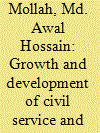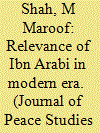| Srl | Item |
| 1 |
ID:
117910


|
|
|
|
|
| Publication |
2011.
|
| Summary/Abstract |
The aim of this article is to analyse the growth and development of bureaucracy as an institution of government in Bangladesh from historical and politico-administrative perspectives. Although it is now an independent state, various Hindu kings, Muslim emperors, British lords and zamindars of the Indian subcontinent ruled the area of Bangladesh for several hundred years. In 1947, when India and Pakistan emerged as independent states, Bangladesh was a part of Pakistan. To understand the growth and development of bureaucracy in Bangladesh, the article is divided into two broad sections: the colonial legacy of both British India and Pakistan (1601-1971) and the Bangladesh period (1971-2008). The structure and working patterns of bureaucracy in Bangladesh are a legacy of British colonial rule, which impeded reform efforts after Independence and caused politicisation of the administration and governance. Civil-military elitisms reduced accountability of the administration, resulting in a dominating bureaucratic structure with corruption.
|
|
|
|
|
|
|
|
|
|
|
|
|
|
|
|
| 2 |
ID:
120853


|
|
|
|
|
| Publication |
2013.
|
| Summary/Abstract |
This article probes the transformation of Kemalism to a xenophobic nation-statism with a strong anti-western animus diluting its self-styled westernism and elitism in response to the rise of the reformist-Islamist ruling JDP and its patchy liberal rhetoric and pro-EU stance. The article points to the novel qualities of the Kemalism of the 2000s but also attests to its inherent anti-elitist, anti-liberal and anti-intellectual nature that reigned in the 1930s given that the Kemalist project in the inter-war period involved the denunciation of the Ottoman establishment with its elite and intelligentsia and its replacement with an intelligentsia of its own that is acquainted with anti-liberalism, anti-cosmopolitism and also anti-intellectualism.
|
|
|
|
|
|
|
|
|
|
|
|
|
|
|
|
| 3 |
ID:
106260


|
|
|
| 4 |
ID:
075369


|
|
|
|
|
| Publication |
2006.
|
| Summary/Abstract |
This essay examines the interconnectedness among realism, elitism, and conservatism, claiming that realism cannot be understood in isolation from conservative skepticism regarding human nature and the possibility of change. Just as conservatism constitutes the foundation of realism, so it also constitutes the foundation of elitist and structural theories of democracy, thereby establishing an inherent interconnection among the three. Such interconnectedness lies at the root of the antagonism that realists display toward policies that aim to promote democracy. Contrary to the common wisdom among international relations scholars, it also implies a strong link between international relations and political science. Moreover, this interconnectedness discredits the positivist philosophy of the social sciences, calling instead for a normative philosophy of the social sciences.
|
|
|
|
|
|
|
|
|
|
|
|
|
|
|
|